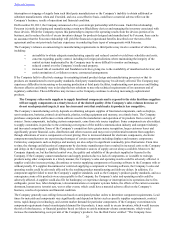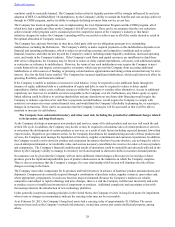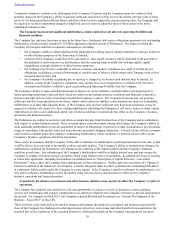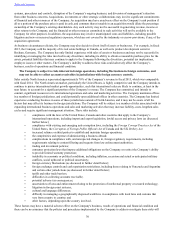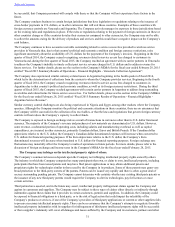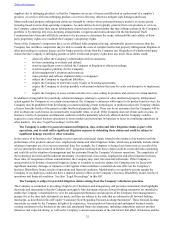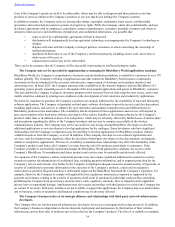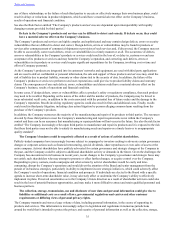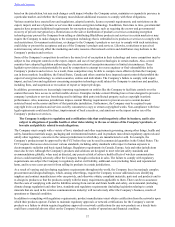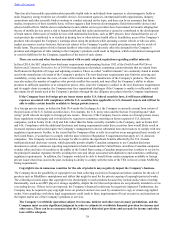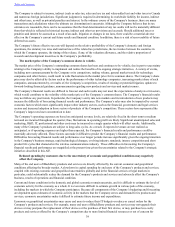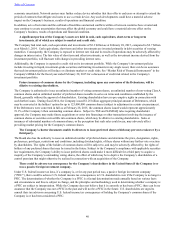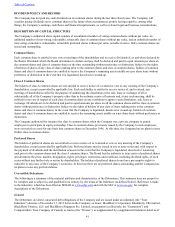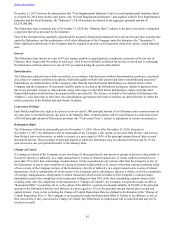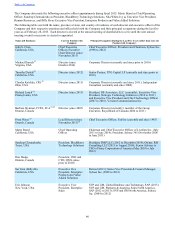Blackberry 2015 Annual Report Download - page 45
Download and view the complete annual report
Please find page 45 of the 2015 Blackberry annual report below. You can navigate through the pages in the report by either clicking on the pages listed below, or by using the keyword search tool below to find specific information within the annual report.
Table of Contents
36
transmission, use and disclosure of such information. In addition, a number of leading companies in the mobile
communications industry, including the Company, have agreed to privacy principles designed to prompt third-party application
developers to conspicuously post privacy policies with their applications.
The interpretation of privacy and data protection laws, and their application to the Internet and mobile communications, in a
number of jurisdictions is unclear and in a state of flux. There is a risk that these laws may be interpreted and applied in
conflicting ways from country to country and in a manner that is not consistent with the Company’s current data protection
practices. Complying with these varying international requirements could cause the Company to incur additional costs and
change the Company’s business practices. In addition, because the Company’s services are accessible worldwide, certain
foreign jurisdictions may claim that the Company is required to comply with their laws, even where the Company has no local
entity, employees, or infrastructure.
The Company could be adversely affected if legislation or regulations are expanded to require changes in its business practices,
if governmental authorities in the jurisdictions in which the Company does business interpret or implement their legislation or
regulations in ways that negatively affect its business or if end users allege that their personal information is not collected,
stored, transmitted, used or disclosed appropriately or in accordance with the Company’s end user agreements and privacy
policies or applicable privacy and data protection laws. If the Company is required to allocate significant resources to modify
its products or services or its existing security procedures for the personal information that the Company transmits and stores,
its business, results of operations and financial condition may be adversely affected.
The Company’s network carriers or other customers, partners or members of its ecosystem may also have differing expectations
or impose particular requirements for the collection, storage, processing and transmittal of user data or personal information in
connection with BlackBerry products and services. Such expectations or requirements could subject the Company to additional
costs, liabilities or negative publicity, and limit its future growth. In addition, governmental authorities may use the Company’s
products to access the personal data of individuals without the Company’s involvement, for example, through so-called lawful
intercept capability of network infrastructure. Even perceptions that the Company’s products do not adequately protect users’
privacy or data collected by the Company, made available to Company or stored in or through the Company’s products or that
they are being used by third parties to access personal or consumer data could impair the Company’s sales or its reputation and
brand value.
In addition, laws in various countries relating to the liability of providers of online services for activities of their users and other
third parties are currently being tested by a number of claims, which include actions for invasion of privacy, libel, slander, and
other tort claims, unlawful activity, copyright and trademark infringement, and other theories based on the nature and content of
the materials searched, the ads posted, or the content generated by users. Certain jurisdictions are also testing the liability of
providers of online services for activities of their users and other third parties. Any court ruling that imposes liability on
providers of online services for activities of their users and other third parties could harm the Company’s business.
Certain governments are also imposing requirements for the filtering of content available to end users. These requirements vary
across varying jurisdictions and compliance with these requirements may be costly. Conversely, a failure to comply could result
in adverse publicity, a ban on the Company’s products and services as well as other regulatory sanctions.
Failure of the Company’s suppliers, subcontractors, third-party distributors and representatives to use acceptable
ethical business practices or to comply with applicable laws could negatively impact the Company’s business.
The Company expects its suppliers and subcontractors to operate in compliance with applicable laws, rules and regulations
regarding working conditions, labor and employment practices, environmental compliance, anti-corruption (including the
Foreign Corrupt Practices Act of the United States, the Corruption of Foreign Public Officials Act of Canada and the UK
Bribery Act), and patent and trademark licensing as detailed in the Company’s Supplier Code of Conduct. However, the
Company does not directly control their labor and other business practices. If one of the Company’s suppliers or subcontractors
violates applicable labor, anti-corruption or other laws, or implements labor or other business practices that are regarded as
unethical, or if a supplier or subcontractor fails to comply with procedures designed by the Company to adhere to existing or
proposed regulations, the shipment of finished products to the Company could be interrupted, orders could be canceled,
relationships could be terminated, the Company’s reputation could be damaged, and the Company may be subject to liability.
Any of these events could have a negative impact on the Company’s business, results of operations and financial condition.
The Company is subject to government laws, regulations, orders, policies and restrictions, including on the sale of
products and services that use encryption technology.
Regulatory initiatives throughout the world can also create new and unforeseen regulatory obligations on the Company, its
products and services. Government regulations applicable to the Company’s products and services may provide opportunities
for competitors or limit industry growth. For example, a change to the regulatory classification of the Company’s products and
services, such as content, taxation, and licensing requirements, could place regulatory obligations commonly reserved for
licensed telecommunications carriers or broadcasters on the Company. The impact of these potential obligations could vary


